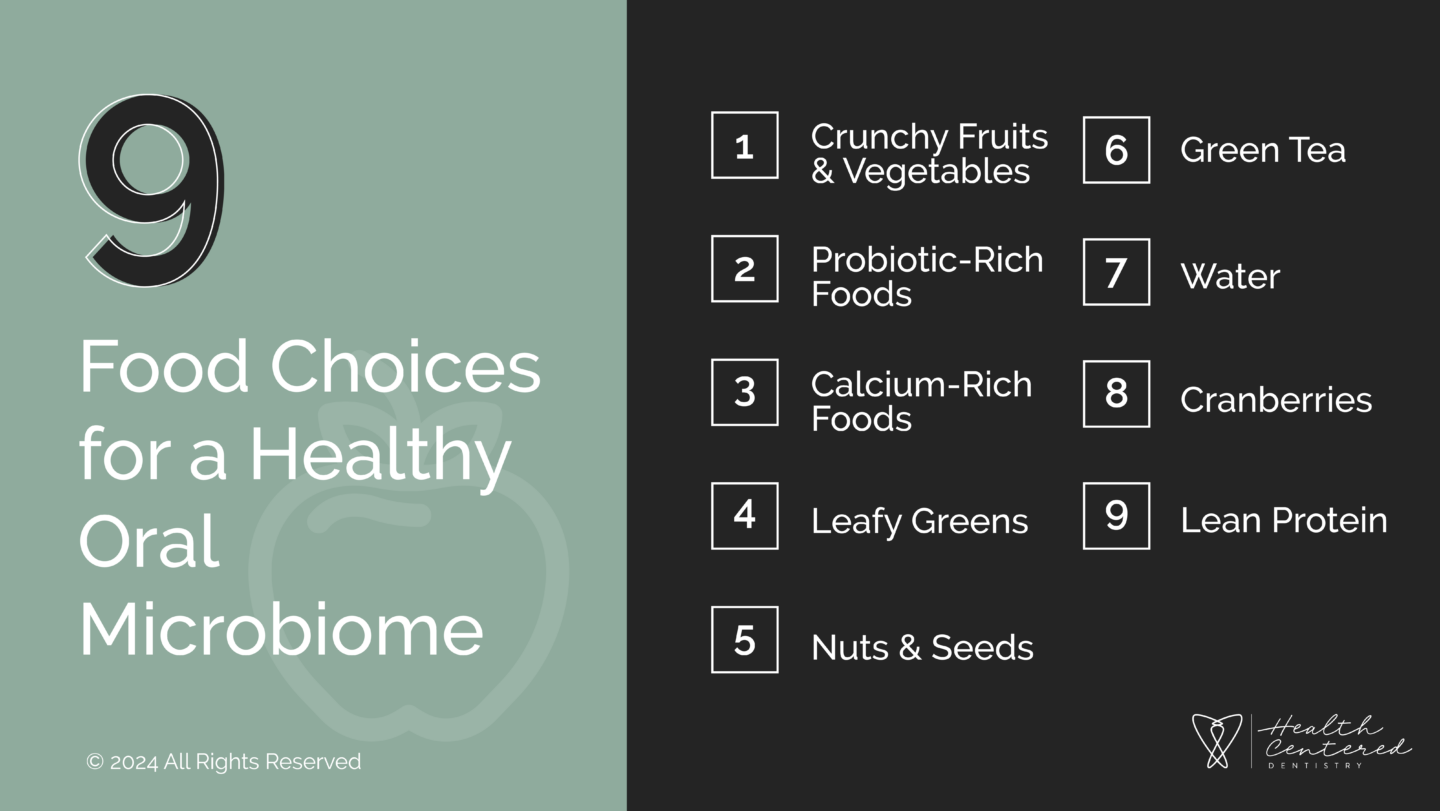In recent years, there has been a growing recognition of the intricate connection between oral health and overall well-being. The truth is, your mouth does more than smile; it serves as a gateway to the rest of your body. As such, the health of our oral microbiome — the diverse community of bacteria, fungi, and viruses that inhabit our mouths — can have profound implications for our systemic health.
Believe it or not, our oral microbiome makes up a unique universe that ultimately forms the foundation for our overall health. At the end of the day, we’re not just talking about healthy teeth and gums here. We’re talking about heart health, bone health, skin health, and much more.
In this blog, we’ll jump into the fascinating world of the oral microbiome and explore how oral health care is interconnected with various aspects of our overall health — including heart health, diabetes, obesity, and more.
When was your last dental visit? Contact Health Centered Dentistry in Anchorage today and schedule an appointment.
What is the Oral Microbiome?
The oral microbiome is a complex ecosystem consisting of trillions of microorganisms that inhabit your mouth. Yes, there are living things in your mouth — and this is good!
It’s important to understand that while some of the microorganisms in your mouth are beneficial and help maintain oral health, others can contribute to disease when the balance is disrupted. For example, factors such as diet, oral hygiene practices, genetics, and systemic health can all influence the composition and diversity of the oral microbiome.
The Connection Between Oral Health and Systemic Health
In recent years, there has been a shift towards a more holistic approach to dentistry—one that recognizes the interconnectedness of oral health and overall health. Dentists and healthcare providers alike are increasingly acknowledging that maintaining optimal oral health is not just about preventing cavities and gum disease — it’s really about promoting overall well-being. As such, by addressing the underlying factors that influence the oral microbiome, such as diet, stress, and systemic health conditions, dentists can play a vital role in supporting your overall health.
Numerous studies in dental and craniofacial research have also demonstrated links between oral health and a variety of systemic health conditions. Here are just a few examples:
- Heart Health: Research suggests that gum disease may be associated with an increased risk of heart disease and stroke. The inflammation and bacteria associated with gum disease may contribute to the development of atherosclerosis (hardening of the arteries) and other cardiovascular problems.
- Diabetes: Conversely, individuals with diabetes are more susceptible to gum disease. Poorly controlled diabetes can impair the body’s ability to fight off infections, including those in the mouth, leading to an increased risk of periodontal disease.
- Obesity: Emerging research suggests that the oral microbiome may play a role in obesity. Imbalances in the oral microbiome have been linked to metabolic disturbances and inflammation, which may contribute to weight gain and obesity.
- Respiratory Health: Oral health problems such as gum disease and tooth decay have been associated with respiratory conditions such as pneumonia and chronic obstructive pulmonary disease (COPD). Bacteria from the mouth can be aspirated into the lungs, leading to infections and inflammation.
Promoting Optimal Oral and Overall Health
Given the intimate connection between oral health and overall health, it’s clear that taking care of your mouth is essential for maintaining your overall well-being. And poor oral hygiene can cause a variety of oral health conditions and overall health problems — including oral cancer. Check out the following tips for promoting optimal oral health:
- Practice Proper Oral Hygiene: Brush your teeth at least twice a day with fluoride toothpaste, floss daily, and visit your dentist regularly for check-ups and cleanings.
- Eat a Balanced Diet: Choose nutrient-rich foods and limit sugary and acidic snacks, which can contribute to tooth decay and gum disease.
- Manage Stress: Chronic stress can weaken the immune system and increase the risk of oral health problems. Find healthy ways to manage stress, such as exercise, meditation, or spending time in nature.
- Address Systemic Health Conditions: If you have a systemic health condition such as diabetes or heart disease, work closely with your healthcare providers to manage your condition and prioritize your oral health.
Food Choices for Supporting a Healthy Oral Microbiome

We are what we eat. It might sound cliché, but this simple statement echoes the truth that what we put in our bodies will affect how we feel and how we live our lives.
Correspondingly, incorporating the following foods into your diet can help support a healthy oral microbiome and promote good oral health.
- Crunchy Fruits and Vegetables: Apples, carrots, celery, and leafy greens are excellent sources of fiber — and great snacks! Not only can they help stimulate saliva production, but they also promote oral health by washing away food particles and bacteria.
- Probiotic-Rich Foods: Yogurt, kefir, kimchi, sauerkraut, and other fermented foods contain beneficial bacteria that can help maintain a healthy balance of microorganisms in the mouth.
- Calcium-Rich Foods: Dairy products like milk, cheese, and yogurt are rich in calcium, which is essential for building strong teeth and bones.
- Leafy Greens: Spinach, kale, and other leafy greens are high in vitamins and minerals, including calcium and vitamin C, which support gum health and overall oral health.
- Nuts and Seeds: Almonds, walnuts, and sesame seeds are rich in nutrients like calcium, phosphorus, and magnesium, which are important for maintaining strong teeth and gums.
- Green Tea: Green tea contains polyphenols and catechins, which have been shown to have antimicrobial properties and may help reduce the risk of cavities and gum disease.
- Water: Drinking plenty of water throughout the day helps keep the mouth hydrated and promotes saliva production, which is essential for rinsing away food particles and bacteria and keeping your mouth feeling fresh!
- Cranberries: Cranberries contain compounds that may help prevent bacteria from sticking to the teeth, and this can help in reducing your risk of cavities and gum disease.
- Lean Proteins: Foods like chicken, fish, and lean cuts of beef provide essential nutrients like phosphorus and vitamin D, which are important for maintaining strong teeth and bones.
Let Health Centered Dentistry in Anchorage be Your Trusted Partner in Oral Health Care
At Health Centered Dentistry in Anchorage, we pride ourselves on being your trusted partner in oral health care services. Our dedicated team is committed to providing compassionate, patient-centered dental services that prioritize your well-being and satisfaction.
Whether you’re in need of routine check-ups, restorative treatments, tooth extractions, or cosmetic procedures, we strive to exceed your expectations and help you achieve a healthy, beautiful smile that you can be proud of. By choosing Health Centered Dentistry as your holistic dental care provider, you can trust that you and your family are receiving the highest quality of care in a welcoming and supportive environment.
At HCD, our holistic approach to dentistry focuses on addressing the root causes of oral health issues and promoting overall wellness. With our comprehensive range of services and personalized treatment plans, we’re here to guide you on your journey to optimal oral health and empower you to make informed decisions about your dental care. If you’re in the Anchorage area, let Health Centered Dentistry be your partner in achieving and maintaining a lifetime of healthy smiles.
Get matched with a holistic dentist today. Contact Health Centered Dentistry in Anchorage and schedule an appointment.


